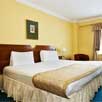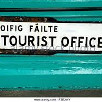Cork
According to the locals, Cork might be the second largest city in Ireland by size but it is first in every important respect. They refer to Cork as the, 'Real capital of Ireland.' Hit hard by economic recession, Cork has been reinventing itself. Revitalised stretches of waterfront and spruced-up streets with an abundance of coffee bars have provided Cork with a youthful, liberal and cosmopolitan feel. Cosy pubs, good quality local restaurants and live-music sessions are easy to find nowadays and the locals might be onto something!

Image: Cork
Cork is the anglicised version of the Irish word Corcaigh, which means marsh. The city centre was originally built on marshland and boats were able to navigate into the channels which separated the many islands. Many of the wider streets, such as St Patrick's Street, the South Mall and the Grand Parade, are actually built on former river channels. St Patrick's Street is Cork's commercial hub, and is known colloquially as either "Patrick Street" or "Pana".
The centre of the city forms an arrow-shaped island between the North and South channels of the River Lee. There are upwards of thirty bridges over the two channels. This, combined with the one-way traffic system, can make the centre a little bit confusing for first-time visitors. The River Lee flows from West to East, and outside of the centre, hills rise steeply to the Northside, while the Southside is that bit flatter but still hilly in parts. St. Anne's Church watches over Shandon, just to the North of the river. The University is about 2km to the west of the centre.
The Train Station is about 1km to the east of the centre. Shops are generally concentrated around St. Patrick's Street, Oliver Plunkett Street, Paul Street and North Main Street. Bars and Restaurants can be found everywhere, but especially around MacCurtain Street, Washington Street and Oliver Plunkett Street. Financial businesses are centred on the area around the South Mall and the Administrative heart of the city is on Anglesea Street.
Stay safe
Cork is a safer city than Dublin. During the night caution should be taken, as in any situation involving large numbers of people and alcohol. However, as in any city the vast majority of people are out simply to enjoy themselves.
Sensible and vigilant behaviour when out late at night should mean that any trouble is avoided. If your safety feels compromised, approach any of the many police or doormen in the city centre, who will be happy to provide assistance. There is virtually no guncrime in Cork, even the general police don't carry guns, so there is no need to worry about firearm violence.




